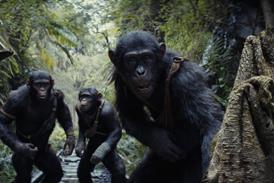We all know about the great tradition of Russian cinema that embraces such movie gods as Eisenstein and Pudovkin, Tarkovsky and Bondarchuk. The modern scene post-Glasnost is another matter.
The first real sense of a meaningful change might best be encapsulated in a personal anecdote that occurred at Las Vegas' ShoWest convention in 2003. An introduction was extended to Michael Schlicht, a chief executive at Gemini Films. A major distributor of Russian movies, Gemini, at the time, also handled Fox product in the former Soviet satellite states of the CIS.
Schlicht was excited about the recent release of 72 Meters, the story of a Russian submarine crew in mortal peril. It had a big opening and was the highest grossing local film in 2003, with revenues of more than $5m. In the course of the discussion I asked about Andrei Zvyagintsev's The Return, which had premiered at Venice and won several major awards (it would go on to be named film of the year by Russian critics). Initially he appeared unfamiliar with the movie but after struggling with the Russian title, a light went off in Schlicht's eyes. He nodded and said knowingly: 'Is only for export.'
Boom time for Russian film
In the brief period since that encounter, Russian film-making and film-going has seen radical growth. A decade ago the country produced fewer than 20 movies annually; last year there were more than 50 titles.
Those films have about a 25% share of a box office that has been growing by 15%-20% annually. And the box-office record set by 72 Meters has been shattered several times, with the crown currently owned by Day Watch with theatrical revenues of roughly $34m.
However, the chasm between the likes of the submarine movie and The Return hasn't appreciably shrunk. 72 Meters is a skillfully crafted picture that pushes all the right buttons. It is also sentimental and patriotic and was never sold to any major territory. Conversely, The Return played just about everywhere as a niche title and grossed about $5.5m internationally.
In industry circles, there's a real appreciation of the more ambitious recent Russian efforts that have included Day Watch, the Afghanistan war-set The 9th Company, robust mythic adventure Wolfhound and sci-fi yarn The Apocalypse Code. Fox acquired the Watch trilogy but despite its best efforts was unable to translate the graphically violent vampire saga for a wider audience than the international arthouse crowd.
A Fox executive admitted there was something 'peculiarly Russian' that confused audiences. Equally frustrating was that market research and exit polling and the like was unable to identify exactly what constituted that peculiarly Russian disconnect. Nonetheless there's a gut instinct at the company and in the acquisitions community that the bloodiness of many of that country's films is too savage and unsparing, especially when compared with the more stylised and often humorous underpinnings of genre fare from Asia.
Russia still makes plenty of films that are recognised for their humanity and social relevance and play to the intelligentsia at home and abroad. Alexei Balabanov's Cargo 200 and Aleksandr Sokurov's Alexandra, for example, were both lauded at film festivals recently. So, there will be 'for export' films that reinforce our sense of that cultural experience. And just as certain, the explosion of talent making popular fare will find its international voice soon and create a whole new cinema experience for the world.
- Contact: klad1213@ca.rr.com.



















No comments yet